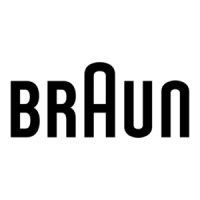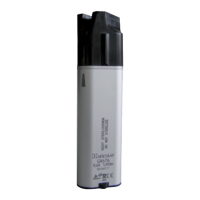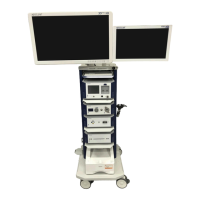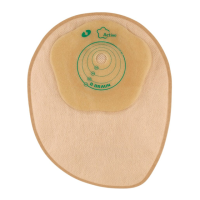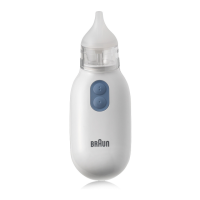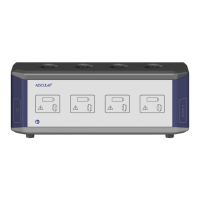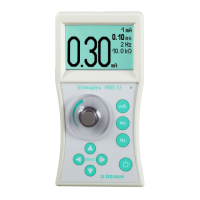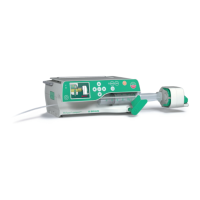3.7 Manual cleaning/disinfection
► Prior to manual disinfecting, allow water to drip off for a sufficient length of time to prevent dilution of the dis-
infecting solution.
► After manual cleaning/disinfection, check visible surfaces visually for residues.
► Repeat the cleaning/disinfection process if necessary.
3.7.1 Manual cleaning with immersion disinfection
D–W: Drinking water
FD–W: Fully desalinated water (demineralized, microbiological, at least of drinking water quality)
RT: Room temperature
*Recommended: BBraun Stabimed fresh
► Note the information on appropriate cleaning brushes and disposable syringes, see Validated cleaning and dis-
infection procedure.
Phase I
► Fully immerse the product in the cleaning/disinfectant for at least 15 min. Ensure that all accessible surfaces are
moistened.
► Clean the product with a suitable cleaning brush in the solution until all discernible residues have been removed
from the surface.
► If applicable, brush through non-visible surfaces with an appropriate cleaning brush for at least 1 min.
► Mobilize non-rigid components, such as set screws, links, etc. during cleaning.
► Thoroughly rinse through these components with the cleaning disinfectant solution (at least five times), using a
disposable syringe.
Phase II
► Rinse/flush the product thoroughly (all accessible surfaces) under running water.
► Mobilize non-rigid components, such as set screws, joints, etc. during rinsing.
► Drain any remaining water fully.
Phase III
► Fully immerse the product in the disinfectant solution.
► Mobilize non-rigid components, such as set screws, joints, etc. during rinsing.
► Rinse lumens at least 5 times at the beginning of the exposure time using an appropriate disposable syringe.
Ensure that all accessible surfaces are moistened.
Phase IV
► Rinse/flush the product thoroughly (all accessible surfaces).
► Mobilize non-rigid components, such as set screws, joints, etc. during final rinse.
► Rinse lumens with an appropriate disposable syringe at least five times.
► Drain any remaining water fully.
Phase V
► Dry the product in the drying phase with suitable equipment (e.g. cloth, compressed air), see Validated cleaning
and disinfection procedure.
3.8 Mechanical cleaning/disinfection
Note
The cleaning and disinfection device must be of tested and approved effectiveness (e.g. FDA approval or CE mark
according to DIN EN ISO 15883).
Note
The cleaning and disinfection device used for processing must be serviced and checked at regular intervals.
3.8.1 Mechanical alkaline cleaning and thermal disinfecting
Machine type: single-chamber cleaning/disinfecting machine without ultrasound
DW: Drinking water
FD–W: Fully desalinated water (demineralized, low microbiological contamination: drinking water quality
at least)
*Recommended: BBraun Helimatic Cleaner alcaline
► Check visible surfaces for residues after mechanical cleaning/disinfecting.
3.9 Mechanical cleaning/disinfection with manual pre-cleaning
Note
The cleaning and disinfection device must be of tested and approved effectiveness (e.g. FDA approval or CE mark
according to DIN EN ISO 15883).
Note
The cleaning and disinfection device used for processing must be serviced and checked at regular intervals.
3.9.1 Manual pre-cleaning with a brush
D–W: Drinking water
RT: Room temperature
*Recommended: BBraun Stabimed fresh
► Note the information on appropriate cleaning brushes and disposable syringes, see Validated cleaning and dis-
infection procedure.
Phase I
► Fully immerse the product in the cleaning/disinfectant for at least 15 min. Ensure that all accessible surfaces are
moistened.
► Clean the product with a suitable cleaning brush in the solution until all discernible residues have been removed
from the surface.
► If applicable, brush through non-visible surfaces with an appropriate cleaning brush for at least 1 min.
► Mobilize non-rigid components, such as set screws, links, etc. during cleaning.
► Thoroughly rinse through these components with the cleaning disinfectant solution (at least five times), using a
disposable syringe.
Phase II
► Rinse/flush the product thoroughly (all accessible surfaces) under running water.
► Mobilize non-rigid components, such as set screws, joints, etc. during rinsing.
3.9.2 Mechanical alkaline cleaning and thermal disinfecting
Machine type: single-chamber cleaning/disinfection device without ultrasound
D–W: Drinking water
FD–W: Fully desalinated water (demineralized, low microbiological contamination: drinking water quality
at least)
*Recommended: BBraun Helimatic Cleaner alcaline
► Check visible surfaces for residues after mechanical cleaning/disinfecting.
3.10 Inspection
► Allow the product to cool down to room temperature.
► Dry the product if it is wet or damp.
3.10.1 Visual inspection
► Ensure that all soiling has been removed. In particular, pay attention to mating surfaces, hinges, shafts, recessed
areas and drill grooves.
► If the product is dirty: repeat the cleaning and disinfection process.
► Check the product for damage, e.g. insulation or corroded, loose, bent, broken, cracked, worn or severely
scratched and fractured components.
► Check the product for missing or faded labels.
► Check the product for damage to the spiral element.
► Check the surfaces for rough spots.
► Check the product for burrs that could damage tissue or surgical gloves.
► Check the product for loose or missing parts.
► Immediately put aside damaged or inoperative products and send them to Aesculap Technical Service, see Tech-
nical service.
3.10.2 Functional test
CAUTION
Damage (metal cold welding/friction corrosion) to the product caused by insufficient lubrication!
► Prior to function checks, lubricate moving parts (e.g. joints, pusher components and threaded rods) with
maintenance oil suitable for the respective sterilization process (e.g. for steam sterilization: STERILIT® I oil
spray JG600 or STERILIT® I drip lubricator JG598).
► Screw attachment onto handle.
► Check that the product functions correctly.
► Check that all moving parts are working property (e.g. hinges, locks/latches, sliding parts etc.).
► Check for compatibility with associated products.
► Immediately put aside inoperative products and send them to Aesculap Technical Service, see Technical service.
Phase Step T
[°C/°F]
t
[min]
Conc.
[%]
Water
quality
Chemical
I Disinfecting clean-
ing
RT
(cold)
>15 2 D–W Aldehyde-free, phenol-free, and
QUAT-free concentrate, pH ~ 9*
II Intermediate rinse RT
(cold)
1- D–W-
III Disinfection RT
(cold)
5 2 D–W Aldehyde-free, phenol-free, and
QUAT-free concentrate, pH ~ 9*
IV Final rinse RT
(cold)
1- FD-W-
V Drying RT - - - -
Phase Step D
[°C/°F]
t
[min]
Water
quality
Chemical/Note
I Prerinse <25/77 3 D–W -
II Cleaning 55/131 10 FD-W
■ Concentrate, alkaline:
–pH ~ 13
– <5 % anionic surfactant
■ working solution 0.5%
– pH = 11*
III Intermediate rinse >10/50 1 FD-W -
IV Thermal disinfecting 90/194 5 FD-W -
V Drying - - - According to the program for cleaning
and disinfection device
Phase Step T
[°C/°F]
t
[min]
Conc.
[%]
Water
quality
Chemical
I Disinfecting clean-
ing
RT
(cold)
>15 2 D–W Aldehyde-free, phenol-free, and
QUAT-free concentrate, pH ~ 9*
II Rinsing RT
(cold)
1- D–W-
Phase Step T
[°C/°F]
t
[min]
Water
quality
Chemical
I Prerinse <25/77 3 D–W -
II Cleaning 55/131 10 FD-W
■ Concentrate, alkaline:
–pH = 13
– <5 % anionic surfactant
■ working solution 0.5%
– pH = 11*
III Intermediate rinse >10/50 1 FD-W -
IV Thermal disinfecting 90/194 5 FD–W -
V Drying - - - According to the program for cleaning
and disinfection device
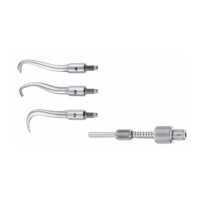
